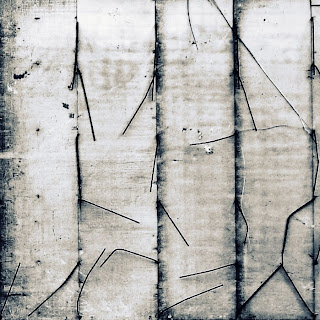| Maria Magdalena - painting by Barbro Östlihn 1966 |
by Ann Kroon
One of the first ever paintings I
wanted to buy at an auction here in Stockholm was one of Barbro Östlihn’s
geometrical wonders. The painting was of course far too expensive for my
student pockets and I forgot about it, with time not even remembering the
painter’s name. Years later, however, I found a note where I had scribbled down
her name and so I was able to find out more through an exhibition catalogue
made by Norrköping’s museum. Again, I was totally awestruck and this time what hit
me the most was how Östlihn in her paintings reworked and redesigned urban
geometrical patterns that she found and captured with her camera on her Manhattan
strolls in the early 1960s.
| Photos by Barbro Östlihn, (reproduced in Öhrner 2010, see below) |
Living in New York City with her husband on a working stipend from
Sweden and walking around middle and lower Manhattan – they had their artist's loft on Front Street, close to Wall Street – what developed into her specialty
was photographing the huge urban renewal taking place, capturing the
last remains of a built environment almost already gone, seemingly drawn to the
unintentional patterns emerging from the actual physical breakdown involved. Academically
trained, mastering perfectly the necessary techniques, she then transformed her
photographs of various emerging urban patterns (from manholes, walls, steam pipes,
signs, street views) through sketches onto large scale paintings.
 |
| panamá |
 |
| costa rica |
When I started to use a digital camera in 2009 while living in Central
America, I soon noticed that I was passionately drawn to the patterns of
concrete blocks, walls, windows, gates and fences. On a visit back
home to Stockholm, I took out the book about Östlihn and boom! I understood the
great inspiration she had been to me.
 |
| backside abf |
I often think about her when I am out
walking the city and capturing whatever my eyes fancy, uncomfortably often trying
to wean off feelings of “this is nothing to shoot”. Through Östlihn I have
permission to see the beauty and urgency in these urban patterns, through her work,
and not least through her creative work process,
it is like she gives me the go-ahead, urging me “please see this as important, if
it is important to you, it is
important”. She makes me feel like I am not alone in entering into conversations
with these urban material stills. She gives me an alternative to the fancy high
style architectural shots that I secretly always found boring, and instead she
points me to the inherently lost beauty of the unintentional geometrical
stunners, the abjected and abandoned, here today, perhaps gone tomorrow.
 |
| demolition dollhouse |
 |
| demolition dollhouse (detail) |
All photos © Ann Kroon when not stated otherwise
-----------------
Swedish art historian Annika Öhrner has made two fantastic books about
Barbro Östlihn. They are written in Swedish with English summaries and both
books contain many reproductions of Östlihn’s work and photography.
Barbro Östlihn & New York. Makadam, 2010.
What an illuminating and well-written text, Ann! I hadn't heard about Östlihn before, and now, knowing more about your sources of inspiration, I can see your photographs of urban details more clearly. Thank you!
ReplyDeletebeauti :) juegos de zombies
ReplyDelete